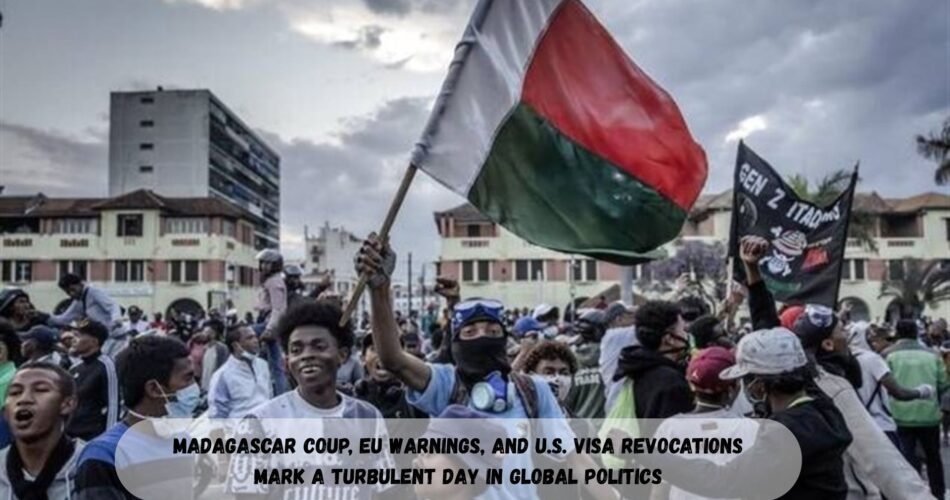October 15, 2025 — A round-up of the past 24 hours in international affairs highlights political unrest in Madagascar, rising tensions between the EU and Serbia, U.S. foreign policy controversies, and continued Western support for Ukraine.
- Madagascar’s Military Seizes Power After President Flees
- EU Warns Serbia Over Slow Reforms and Moscow Ties
- U.S. Revokes Visas Over Online Posts Targeting Activist Charlie Kirk
- Trump Announces Billion Currency Swap With Argentina
- Nordic Nations Pledge New Support for Ukraine
- Poland Warns of Russian Threat, Calls for “Drone Wall”
- U.S. Strike Off Venezuela’s Coast Leaves Six Dead
- Summary: A Day of Escalating Global Tensions
Madagascar’s Military Seizes Power After President Flees
Madagascar’s military announced on October 15, 2025, that it had taken control of the government after President Andry Rajoelina fled the country.
The move followed weeks of youth-led protests in the capital, Antananarivo, and a rebellion by an elite army unit that accused the government of corruption and economic mismanagement.
Military officials declared a transitional authority would be formed “to restore stability and public order.”
- Who: Malagasy Armed Forces
- What: Military coup and assumption of power
- When: October 15, 2025
- Where: Antananarivo, Madagascar
- Why: Political unrest, protests, and a split within the military
- How: The army took control after the president fled abroad
Regional observers, including the African Union (AU), condemned the coup and called for calm, while France and the United Nations urged all sides to seek dialogue.
EU Warns Serbia Over Slow Reforms and Moscow Ties
In Brussels, European Commission President Ursula von der Leyen issued a stern warning to Serbia, urging the government to accelerate reforms on rule of law, elections, and media freedom.
She cautioned that EU patience was “wearing thin” as Belgrade continued close cooperation with Moscow, especially in energy and security matters.
Serbia, a formal EU candidate since 2012, has faced criticism for limited democratic progress and pro-Russian stances since the start of the Ukraine war in 2022.
Key Areas of Concern
| Issue | EU Concern | Required Reform |
|---|---|---|
| Rule of Law | Weak judiciary | Strengthen independence |
| Media Freedom | Pro-government bias | Ensure balanced reporting |
| Elections | Fairness questioned | Implement transparent voting laws |
| Foreign Policy | Moscow ties | Align with EU sanctions |
EU officials signaled that future funding and accession talks could be delayed unless Serbia demonstrates “clear and measurable” progress.
U.S. Revokes Visas Over Online Posts Targeting Activist Charlie Kirk
The U.S. State Department revoked six visas belonging to foreign nationals from South Africa, Mexico, Brazil, Paraguay, and Argentina after social media comments criticized conservative activist Charlie Kirk.
Officials said the individuals had expressed “hostility toward Americans”, and that the United States “would not host” such foreign visitors.
The decision sparked debate over free speech and diplomatic consistency, as critics noted the move appeared politically selective.
A spokesperson for the State Department said the visa revocations followed “routine review processes,” while declining to identify the individuals affected.
Trump Announces Billion Currency Swap With Argentina
Former U.S. President Donald Trump announced that the United States would extend a $20 billion currency swap to Argentina, aimed at supporting President Javier Milei’s administration.
Trump stated the arrangement was designed to boost Argentina’s economic confidence ahead of midterm elections, but warned that Washington would not “waste our time” if Milei’s party lost power.
Economists in Buenos Aires described the deal as politically charged, saying it ties Argentina’s economic stability to U.S. electoral preferences.
Details of the Currency Swap
| Country | Value (USD) | Purpose | Duration |
|---|---|---|---|
| Argentina | $20 billion | Currency stabilization | 12 months |
| U.S. Federal Reserve | Counterparty | Liquidity support | Renewable |
Analysts say the swap could help Argentina strengthen the peso temporarily, but long-term benefits depend on structural reforms and political stability.
Nordic Nations Pledge New Support for Ukraine
Three northern European countries — Sweden, Estonia, and Finland — pledged new funding to buy U.S. military equipment for Ukraine under NATO’s Prioritized Ukraine Requirements List (PURL).
The initiative aims to supply Ukraine with essential defense tools, including air-defense systems, drones, and ammunition.
However, Spain, Italy, France, and Britain were criticized for limited financial contributions, raising concerns about uneven support within NATO.
NATO officials said the new funding would “fill urgent gaps” in Ukraine’s defense capabilities as the war with Russia continues into its fourth year.
Poland Warns of Russian Threat, Calls for “Drone Wall”
Poland’s Foreign Minister Radoslaw Sikorski issued a warning that Russia could strike deep into Europe if the continent fails to enhance its defenses.
He called for the creation of a “drone wall” — a collective EU and NATO initiative to secure the eastern border with advanced aerial surveillance and defense systems.
Sikorski said Poland, Lithuania, Latvia, and Finland had already discussed joint procurement plans for unmanned defense technologies.
The proposal comes amid increased Russian drone incursions into neighboring airspaces.
U.S. Strike Off Venezuela’s Coast Leaves Six Dead
The U.S. military conducted another maritime strike off Venezuela’s northern coast, killing six individuals accused of transporting illicit substances.
President Donald Trump confirmed the operation, describing it as part of Washington’s anti-narcotics campaign in the Caribbean.
The Venezuelan government condemned the attack as a violation of its sovereignty, demanding an international investigation.
Regional analysts warned that the incident could escalate U.S.–Venezuela tensions, already strained by sanctions and political disputes.
Summary: A Day of Escalating Global Tensions
From Madagascar’s coup to visa controversies in the United States and mounting defense pressures across Europe, the past 24 hours underscored a growing climate of political instability and strategic realignment.
Observers say the coming days will test how world leaders manage crises that stretch from the Indian Ocean to the Americas — and whether diplomacy can keep pace with unrest.

